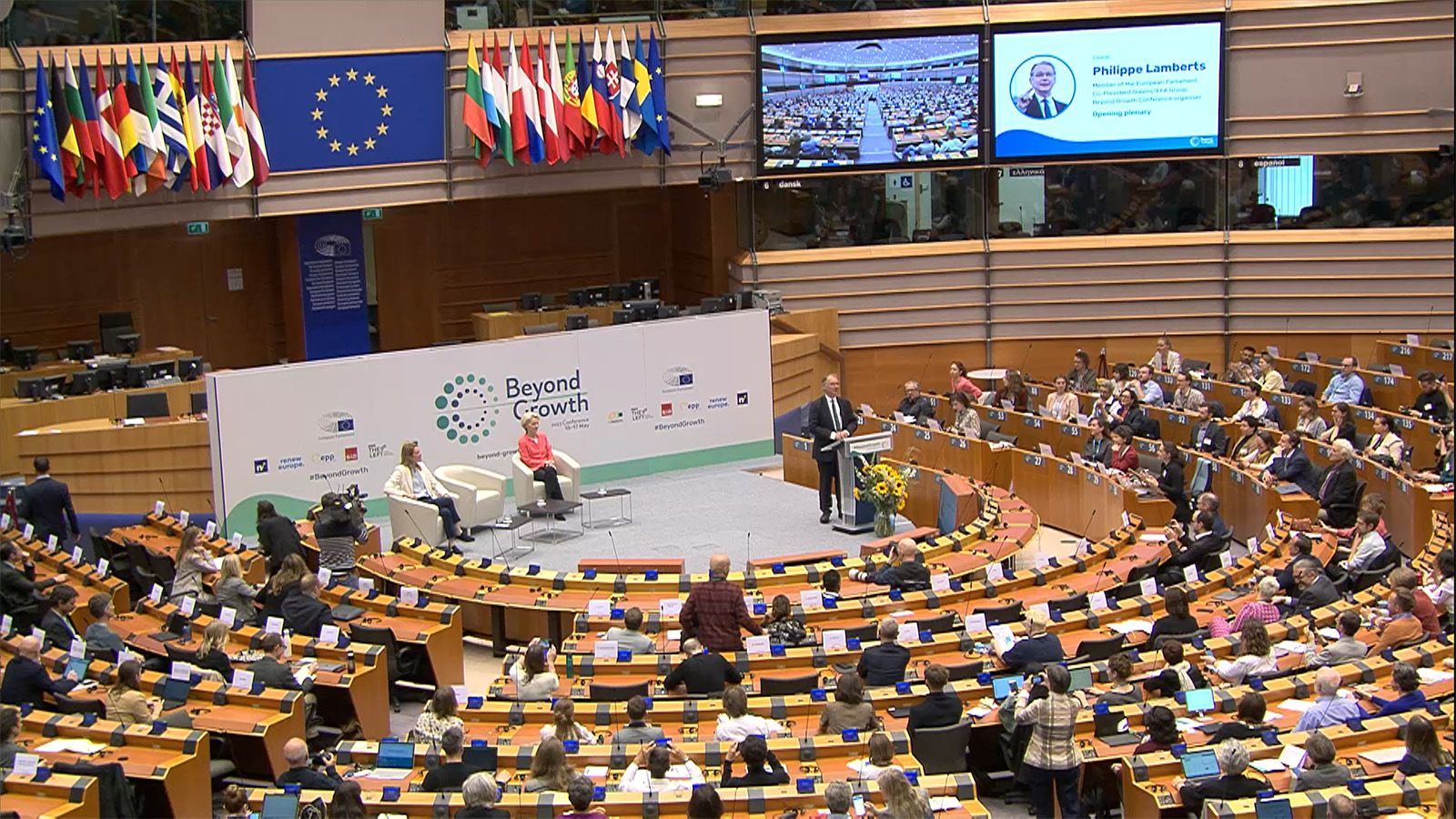By Martin Calisto Friant & Gijs van de Merbel
From 15 to 17 May, an event took place that has been jokingly nicknamed the “Woodstock of Degrowth”: the 2023 Beyond Growth Conference. Leading academics, civil society representatives, MEPs and more gathered in the plenary hall of the European Parliament to, in the organization’s own words, “discuss and co-create policies for sustainable prosperity in Europe, based on a systemic and transformative approach to economic, social and environmental sustainability and its encompassing governance framework.”
A landmark occasion on the road towards degrowth. Or was it? The event clearly showed the two sides of the current state of degrowth and post-growth thinking. On one side, the increasing momentum accumulated by degrowth in the academic sphere and certain political circles; on the other, the huge gap between theory and practice that still needs to be bridged. We reflect on the positives, negatives, and the way forward from here.
A holistic view of degrowth
Encouragingly, the Beyond Growth conference was organized by a diverse coalition of MEPs from across the political spectrum, ranging from The Left to the Greens to the Christian-Democratic EPP. In a total of 20 focus panels and 7 plenary discussions, there was room for detailed discussion on all aspects of post-growth. Topics ranged from digital economy and finance to the four-day work week and the impact of degrowth on the Global South. Speakers did not shy away from discussing key social justice topics and progressive policies like Universal Basic Income, job guarantees, debt cancellation and modern monetary policy. In discussions on the energy transition and climate change, particularly, sufficiency policies took center stage – choosing having ‘enough’ over growth and production for its own sake. Overall, there was a consensus that actions and policies must happen at a systemic level rather than putting blame and responsibility on the individual citizen. It was highly encouraging to see that the conference’s organizers managed to avoid a focus only on technocratic, financial-economic issues and instead made space to discuss degrowth in a holistic, systemic manner. In a discussion about our shared future, nothing should be taboo!
Mythbusting
Across the plenaries and panels, a good deal of time was spent discussing and debunking misconceptions and wrong assumptions about the economy as a whole and degrowth in particular. Busted myths include the independence of central banks, the effect and desirability of economic growth in society, “trickle-down” economics, and of course the difference between degrowth and economic recession: A familiar scene for anyone who’s ever tried to discuss degrowth with friends or colleagues! And though each panel was packed with experts, the message still did not seem to be clear for everyone. Particularly for the handful of European Commissioners (including President Ursula von der Leyen) who contributed to the conference by re-asserting their status quo line of thought and repeating neoliberal misconceptions, before leaving after a few minutes. These politicians interpret post-growth as a way of going beyond growth by including other aspects, such as social justice and environmental sustainability, in addition to the growth imperative. They see post-growth as a way to create new growth models that are “inclusive”, “sustainable”, and “equitable” as well as complementing GPD growth with other indicators but not ditching growth altogether for a post-growth and post-capitalist society. Yet this was in no way the dominant vision promoted by participants and panellists. Most speakers actually proposed a radical decolonial and transformational vision of post-growth, to loud cheers and applause from the audience.
A painful reminder or a beacon of hope?
The organizing MEPs' progressiveness is inspiring, but it raises questions about the EU's past two decades under right-wing dominance. What would the EU have looked like without their influence? Giorgios Kallis discussed the destruction of degrowth in practice on Mediterranean islands by EU neoliberal policies promoting austerity and liberalization. The same harm occurs in the Global South, as the EU prioritizes austerity, commodification, and deregulation for European companies' gain. This neo-colonial violence restricts alternatives, forcing social movements to combat oppressive policies instead of advocating transformative change. What if the EU pursued care and universal basic services, collaborated with Global South countries, and adopted alternative indicators like Bhutan's Gross Happiness Index?
International press coverage further illustrates the gap between the state of theory and public understanding. Here is an event in which the fundaments of our future societies are being seriously discussed in the heart of European power, and yet only a handful of European news outlets seem to have picked up on it. Many of them take it upon themselves to once again misinterpret and misrepresent degrowth – most strikingly this maliciously-titled hit piece published in The Economist. Most others make do with a short summary of events. A nice exception is the balanced discussion of the conference and the concept of degrowth published in NRC.
Herein lies the key takeaway from the 2023 Beyond Growth Conference. In progressive and academic circles, the need to move away from growth-focused neoliberal capitalism to an equitable society that promotes wellbeing for all seems firmly established. Establishment politicians are taking note, as evidenced by the long list of EU functionaries present at the conference, but most of them remain stuck in conventional ways of thinking and misconceptions, as does much of the media and, by extension, the public.
Rather than despairing about how much work still has to be done, however, we should take these reflections as motivation to keep going, as a reminder that our movement is growing and that the establishment is being forced to take note. It is fair to say that this conference was a monumental moment. There was so much positive energy in the room, a feeling like history was being made before our eyes and that we were witnessing a unique political moment. The door for more degrowth thinking and action in Europe and beyond may have been opened last week, and we must keep working to make sure it stays wide open.

